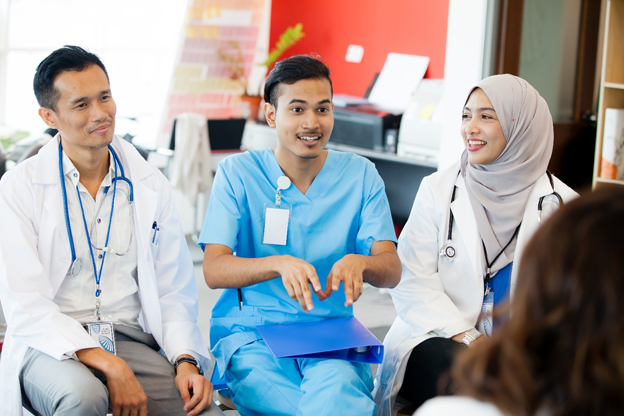Reflections: Innovation at Work
November 27, 2018

By Melinda McIntire, ECMC Foundation
The first days in my new role as a program officer at ECMC Foundation were truly exciting as I participated in a week of site visits to the three Altierus Career College (Altierus) campuses in Tampa, FL, Norcross, GA, and Bissonnet, TX. These three innovation (or lab) schools are designed to test, adopt, and share new approaches that benefit the career and technical education field.
My colleagues and I met with personnel at each campus to di scuss their ideas submitted as part of the Campaign for Innovation (CFI), an initiative that provides grants to Altierus campuses interested in implementing innovative solutions to advance student success. This is the fourth year of the Campaign for Innovation and over the course of the program, ECMC Foundation has granted upwards of $5 million to improve academic success and career preparedness, develop and refine new programs, support faculty and staff development, enhance campus and classroom facilities, incorporate new learning tools and updated technology, support community partnerships, and provide wraparound supports for students on-campus.
These ideas are generated and submitted by campus faculty, staff, and administrators – giving all team members at Altierus the ability to drive exciting developments on-campus – something that is unique to the Campaign for Innovation. As they are on the ground each day, these faculty and staff understand what opportunities and resources might better the classroom experience and campus community.
Altierus stands out among peer organizations because of their approach to preparing students for careers. Throughout my professional experience I have worked directly with students at higher education institutions and community-based organizations giving me exposure to a variety of models that help students succeed. I was thrilled to witness the innovative learning techniques and leading career development practices utilized on the Altierus campuses. Upon touring each campus, I saw simulated drugstore pharmacies, dentist offices, and HVAC systems found in homes and office buildings. These are just a few examples of the hands-on learning labs Altierus utilizes to mimic the workplace and prepare students for life after graduation.
This year, as part of the Campaign for Innovation, ECMC Foundation has made grants that will impact all three Altierus campuses. Summaries of select projects are listed below.
- A grant was made to establish and support a chapter of Health Occupational Students of America (HOSA) at the Norcross Altierus campus. The goal is to enhance the student experience through increased leadership, engagement, and professional opportunities. ECMCF funding provides support for membership fees, uniforms, materials, and related conference costs.
- A grant was made to improve the learning experience for Medical Assistant students at the Altierus Norcross campus. The goal is to provide hands-on learning to students early in the curriculum and enhance outreach and recruitment events. ECMCF funding provides support for the purchase of two Nasco Advanced Geri Manikins.
- A grant was made to create a virtual CTE tour and interactive videos at the Altierus Bissonet and Norcross campuses. The goal is to showcase the campus experience to prospective students and promote career and technical education to the larger field. ECMCF funding provides support for video production and staff travel.
- A grant was made to incorporate a contextualized English learning component for Allied Health students at the Altierus Tampa campus. The goal is to integrate core language objectives in partnership with ReDefiners World Language into the Intro to the Healthcare Profession course for students who are English language learners. ECMCF funding provides support for curriculum design, classroom facilitation, and program evaluation.
I am particularly intrigued by Altierus Tampa’s new contextualized English language learning program. Over the last few years the campus has experienced an increase in the number of students who speak English as a second language. The curriculum will be taught using a blended learning model (education both in the classroom and online) and integrated into the program-specific introduction course. The faculty hopes this approach will help students increase their English language proficiency in their field of choice leading to higher rates of job placement upon graduation.
I’m pleased to see the passion and commitment coming from the campus personnel receiving funding through the 2018 Campaign for Innovation. They are thinking critically about the challenges facing their campus communities and implementing strategic interventions to help students succeed. I look forward to monitoring the progress of these projects, lifting up success stories, and sharing the lessons learned with the career and technical education field.
